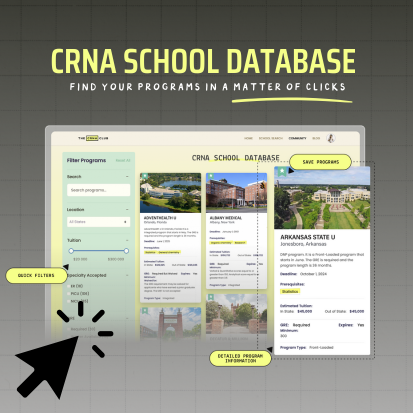The Self-Evaluation Exam (SEE) is one of the most challenging tests you will encounter during CRNA school. It requires deep understanding, mental endurance, and strategic studying. There is SO much information to learn and retain that it can easily become overwhelming. Before I dive deeper into helpful tips and tricks for studying for the SEE, let me just preface with this: It was HARD, the hardest test I’ve ever taken. The questions were NOT straightforward, and I can’t even compare them to anything I did in didactic. You’ll think you’ll know the answer, and then it won’t be there; it’s 3 levels deeper than you think it is. So you really have to understand the material. When I began studying for the SEE the first time (we have to take it twice in my program), it was helpful for me to reframe my thinking – I wasn’t “cramming” or trying to memorize all of the information, I was learning material in a way that is applicable and made sense me. It’s not so much about memorization as it is understanding the why. If you understand the why behind it, then you can work your way through the questions on the SEE.
I used various different methods to help me study for the SEE. I personally learn well from 1. practice questions and 2. grouping concepts/mind maps. Here’s how different types of learners can effectively prepare for the SEE:
I’ve highlighted the items I think are high-yield and believe everyone should do regardless of your learning style!
Visual Learners
If you absorb information best through images, diagrams, and visual organization, these strategies will help:
— Use APEX Study Guides – These include structured outlines, diagrams, and charts that break down complex topics. You can find these downloads under “Supplemental Materials → Study Plans” and you can download their study plans.
— Color Code & Mind Maps – Use different colors for various domains (e.g., red for cardiac, blue for respiratory) to help visually organize topics.
— Draw Processes – Sketch out physiology pathways, anesthesia machine components, and pharmacology mechanisms.
— Group Concepts Together – Use visual connections to categorize related information, making it easier to recall.
Auditory Learners
If you retain information best through listening, incorporate these techniques into your study routine:
— Listen to Anesthesia and Critical Care Reviews and Commentary (ACCRAC) Keywords and Lightning Round Episodes – These are great for reinforcing major topics. You can listen online here: https://accrac.com/, on Spotify, or on Apple Podcasts
— Explain Concepts Out Loud – Try teaching a friend or recording yourself explaining key principles.
— Use Text-to-Speech Software – Convert study materials into audio and listen while commuting or exercising. There are many apps out there that will convert text to audio (including textbooks!)
— Join a Study Group – Discussing challenging topics with others will reinforce your understanding.
— Repeat Important Information – Reading key concepts aloud multiple times can aid retention. My favorite way to do this was while driving.
Reading/Writing Learners
If you learn best through written words, structured reading and writing exercises will be your best tools:
— Use NBCRNA Handbook & SEE Resources – Read official guidelines and study them methodically. The outline can be found here:
— The NBCRNA also has an exam tutorial found here:
https://www.nbcrna.com/students/nce-resources/nce-see-exam-tutorial
— Take Notes from APEX Modules – Summarize key points in your own words. When you reword things in your own words, you’re more likely to understand and retain the information!
— Write & Re-Write Key Concepts – This reinforces memory through active engagement. You can also use platforms such as Anki and RemNote for active recall.
— Use Online Question Banks –Answering daily questions from CC Anesthesia Review (http://www.ccanesthesiareview.com/QOD/QOD.asp) and OpenAnesthesia (https://www.openanesthesia.org/) helps reinforce material.
— Keep a Study Journal – Document your progress, challenging topics, and reflections on mock exams. This was HUGE for me! I loved tracking my progress and seeing my growth. APEX has a pre-made one under the “4-Week Boards Bootcamp” download under “Supplemental Materials”
Kinesthetic Learners
If hands-on learning is your strength, try these techniques:
— Practice with Mock Exams – Take full 240-question exams to build stamina and simulate test conditions. It’s honestly half a mental game and keeping your composure even when you don’t think you know the answer. Building up that stamina to take all 240 questions even when you feel like you aren’t answering the questions well is incredibly helpful for when you sit down for the actual exam.
— Engage in Spaced Repetition – Use flashcards and repeatedly quiz yourself over time.
— Actively Work Through Math & Calculations – Use APEX calculation problems to apply concepts practically.
— Write & Draw on a Whiteboard – Recreate diagrams, formulas, and critical information as a form of physical interaction.
— Time Yourself in Exam Mode – Taking practice tests under timed conditions will train you for the real SEE.
General Study Tips for the SEE
— Do Daily Questions (at least 10 questions/day) – Use Prodigy** and APEX question banks consistently. (Prodigy is another online resource that has an associated cost. I would not recommend purchasing if you did not purchase it for your program – instead, purchase the add-on question bank from APEX)
— I personally believe that the APEX Domain Practice Exams are the most helpful.
— Expect to Take the Full 4.5 Hours – Even the fastest test takers needed nearly all of their time.
FINAL ADVICE: You WILL feel like you’re failing during the SEE—that’s normal. The test is designed to push you. Stick to your study plan, simulate exam conditions, and keep practicing until you feel confident. You CAN do this!
Other helpful links:
SEE Handbook: https://www.nbcrna.com/docs/default-source/publications-documentation/handbooks/nbcrna-hb-nce.pdf?sfvrsn=2d78115b_11
SEE Resources: https://www.nbcrna.com/students/see-resources
SEE Facts: https://nbcrna.zendesk.com/hc/en-us/sections/4413143763739-SEE-FAQs
SEE Exam Tutorial: https://www.nbcrna.com/students/nce-resources/nce-see-exam-tutorial
Ready for more tips on how to get into CRNA school? Check out our community here!



